Unit 11 How was your school trip Section AGrammar Focus-3b-课件(共42张PPT)
文档属性
| 名称 | Unit 11 How was your school trip Section AGrammar Focus-3b-课件(共42张PPT) | 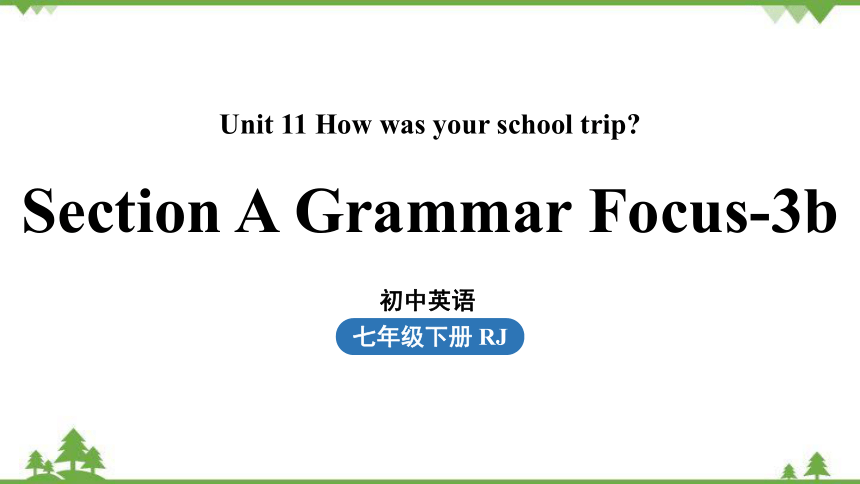 | |
| 格式 | pptx | ||
| 文件大小 | 1.9MB | ||
| 资源类型 | 教案 | ||
| 版本资源 | 人教新目标(Go for it)版 | ||
| 科目 | 英语 | ||
| 更新时间 | 2022-11-02 20:21:11 | ||
图片预览

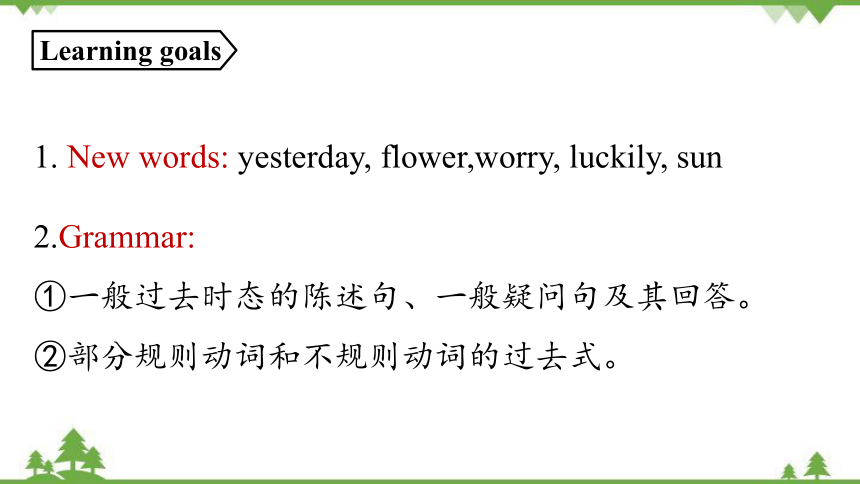
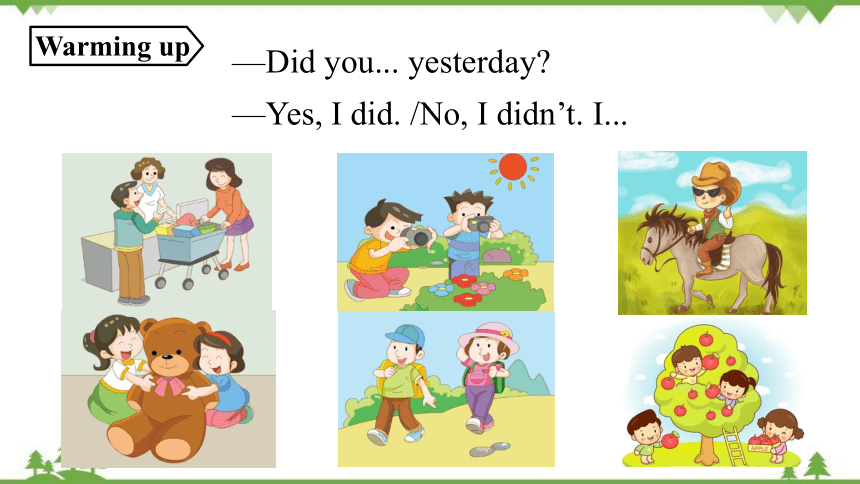
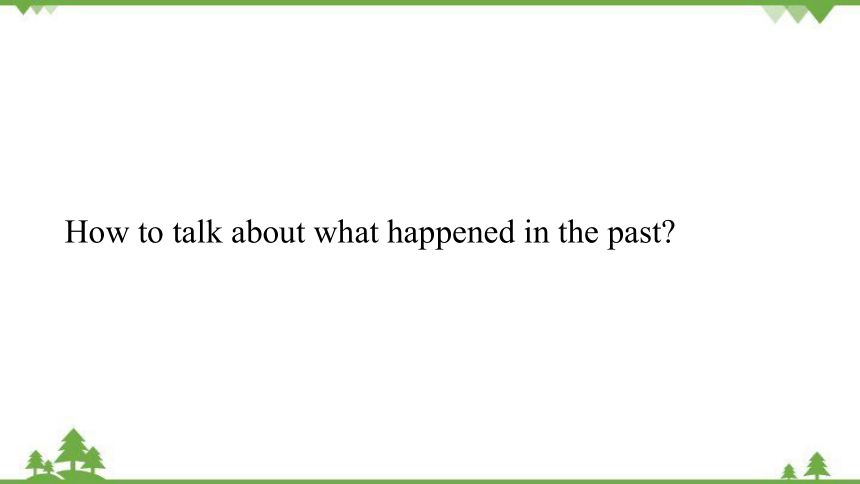

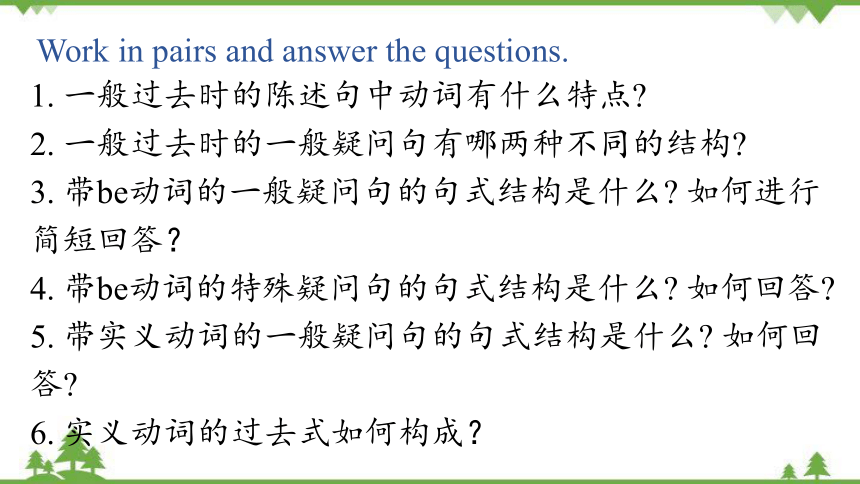
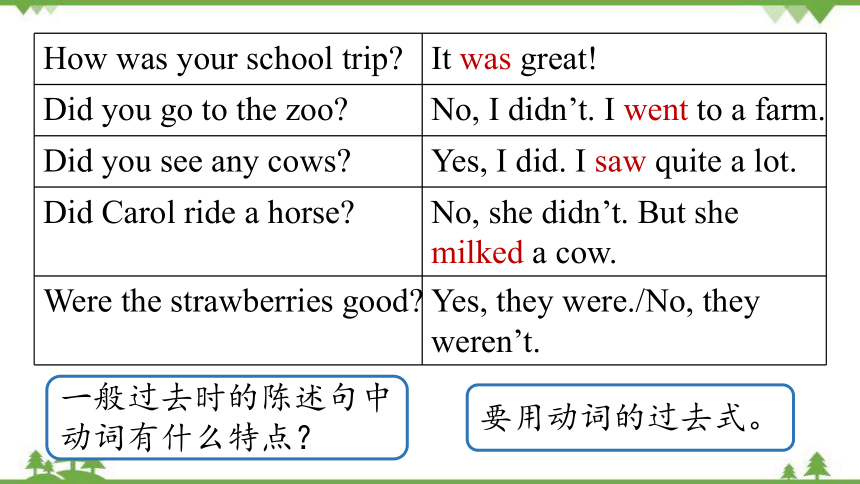
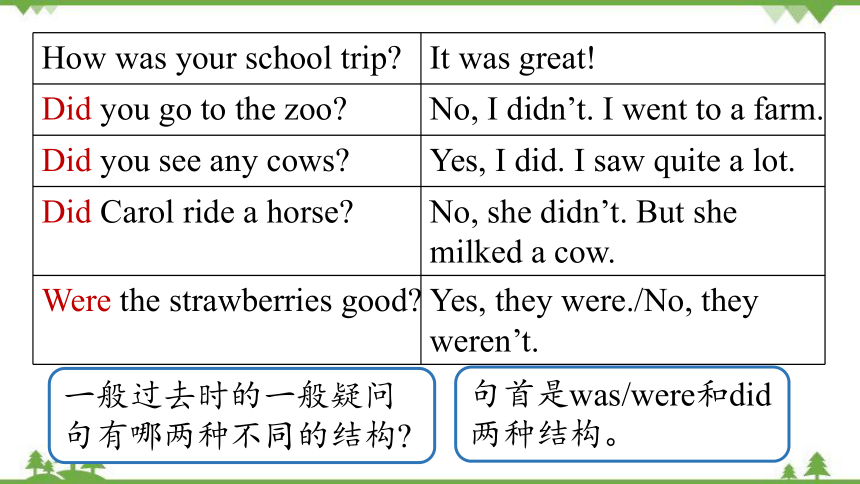
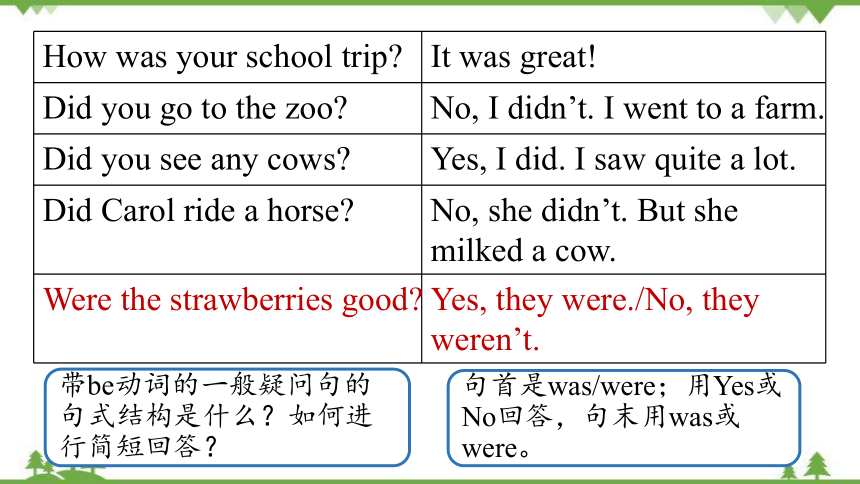
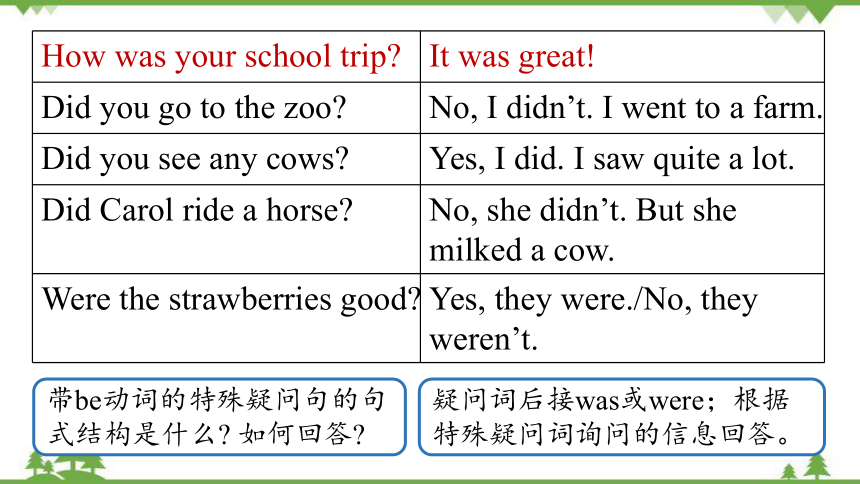
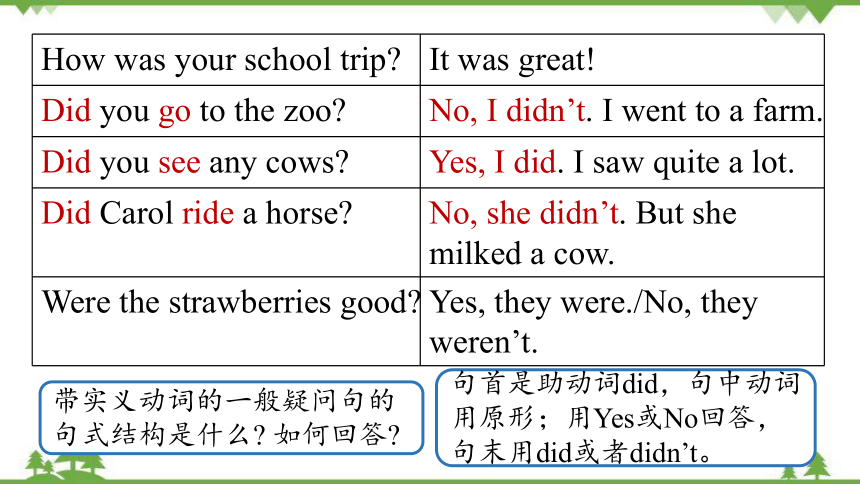
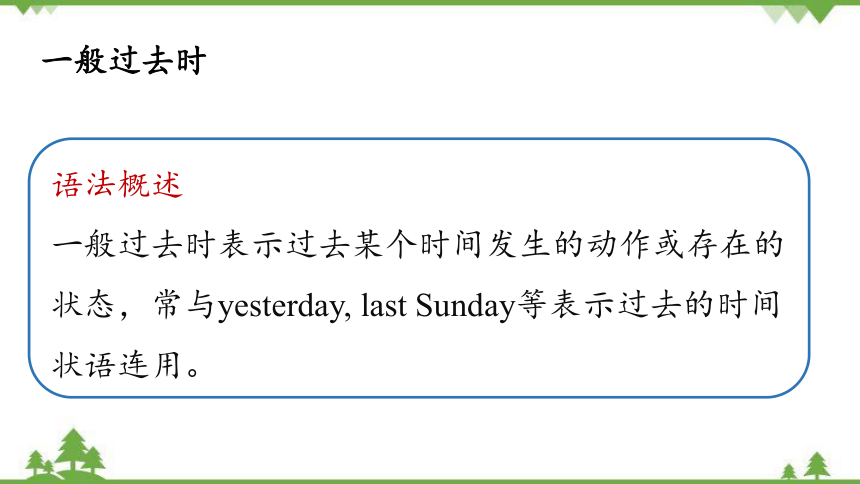
文档简介
(共42张PPT)
Section A Grammar Focus-3b
Unit 11 How was your school trip
初中英语
七年级下册 RJ
2.Grammar:
①一般过去时态的陈述句、一般疑问句及其回答。
②部分规则动词和不规则动词的过去式。
Learning goals
1. New words: yesterday, flower,worry, luckily, sun
—Did you... yesterday
—Yes, I did. /No, I didn’t. I...
Warming up
How to talk about what happened in the past
How was your school trip It was great!
Did you go to the zoo No, I didn’t. I went to a farm.
Did you see any cows Yes, I did. I saw quite a lot.
Did Carol ride a horse No, she didn’t. But she milked a cow.
Were the strawberries good Yes, they were./No, they weren’t.
Observe this chart.
Grammar Focus
1. 一般过去时的陈述句中动词有什么特点
2. 一般过去时的一般疑问句有哪两种不同的结构
3. 带be动词的一般疑问句的句式结构是什么 如何进行简短回答?
4. 带be动词的特殊疑问句的句式结构是什么 如何回答
5. 带实义动词的一般疑问句的句式结构是什么 如何回答
6. 实义动词的过去式如何构成?
Work in pairs and answer the questions.
How was your school trip It was great!
Did you go to the zoo No, I didn’t. I went to a farm.
Did you see any cows Yes, I did. I saw quite a lot.
Did Carol ride a horse No, she didn’t. But she milked a cow.
Were the strawberries good Yes, they were./No, they weren’t.
一般过去时的陈述句中动词有什么特点?
要用动词的过去式。
How was your school trip It was great!
Did you go to the zoo No, I didn’t. I went to a farm.
Did you see any cows Yes, I did. I saw quite a lot.
Did Carol ride a horse No, she didn’t. But she milked a cow.
Were the strawberries good Yes, they were./No, they weren’t.
一般过去时的一般疑问句有哪两种不同的结构
句首是was/were和did
两种结构。
How was your school trip It was great!
Did you go to the zoo No, I didn’t. I went to a farm.
Did you see any cows Yes, I did. I saw quite a lot.
Did Carol ride a horse No, she didn’t. But she milked a cow.
Were the strawberries good Yes, they were./No, they weren’t.
带be动词的一般疑问句的句式结构是什么?如何进行简短回答?
句首是was/were;用Yes或No回答,句末用was或were。
How was your school trip It was great!
Did you go to the zoo No, I didn’t. I went to a farm.
Did you see any cows Yes, I did. I saw quite a lot.
Did Carol ride a horse No, she didn’t. But she milked a cow.
Were the strawberries good Yes, they were./No, they weren’t.
带be动词的特殊疑问句的句式结构是什么 如何回答
疑问词后接was或were;根据特殊疑问词询问的信息回答。
How was your school trip It was great!
Did you go to the zoo No, I didn’t. I went to a farm.
Did you see any cows Yes, I did. I saw quite a lot.
Did Carol ride a horse No, she didn’t. But she milked a cow.
Were the strawberries good Yes, they were./No, they weren’t.
带实义动词的一般疑问句的句式结构是什么 如何回答
句首是助动词did,句中动词用原形;用Yes或No回答,句末用did或者didn’t。
语法概述
一般过去时表示过去某个时间发生的动作或存在的状态,常与yesterday, last Sunday等表示过去的时间状语连用。
一般过去时
一般过去时的句式
(1)含be动词的一般过去时的句式
肯定句 主语 + was/were + 其他.
否定句 主语 + was not( wasn’t)/were not( weren’t) + 其他.
一般疑问句及其回答 Was/Were + 主语 + 其他
Yes, 主语 + was/were.
No, 主语 + wasn’t/weren’t.
I was late for school yesterday. 昨天我上学迟到了。
My parents weren’t interested in pop songs. 我父母对流行歌曲不感兴趣。
—Was your father at home 你爸爸在家吗?
— Yes, he was. /No, he wasn’t. 是的,他在家。/ 不,
他不在家。
(2)含实义动词的一般过去时的句式
肯定句 主语 + 动词过去式 + 其他.
否定句 主语 + did not(didn’t) + 动词原形 + 其他.
一般疑问句及其回答 Did+ 主语 + 动词原形 + 其他
Yes, 主语 + did.
No, 主语 + didn’t.
We went to the farm last weekend. 上周末我们去农场了。
Tom didn’t go to work this morning. 汤姆今天上午没去上班。
Did you ride a horse 你骑过马吗?
Yes, I did. /No, I didn’t. 是的,我骑过。/不,我没骑过。
【特别提醒】若陈述句的主语是第一人称,变疑问句时应改为第二人称,句末改为问号。
I played football with my friends yesterday afternoon. 昨天下午我和我的朋友们踢足球了。
Did you play football with your friends yesterday afternoon 昨天下午你和你的朋友们踢足球了吗?
Regular verbs Irregular verbs
play→ played visit → visited climb → climbed study → studied worry → worried stop → stopped do → did
is → was
are → were
have → had
eat→ ate
buy → bought
实义动词的过去式
如何构成?
有规则变化和不规则变化。
动词过去式的构成
类别 构成方法 例词
一般情况 加-ed want → wanted
clean → cleaned
以e结尾的动词 加-d live → lived
like → liked
以“辅音字母 + y” 结尾的动词 变y为i, 再加-ed study → studied
carry → carried
以重读闭音节结尾,且末尾只有一个辅音字母的动词 双写末尾的辅音字母,再加-ed stop → stopped
plan → planned
(1)规则动词过去式的构成
【特别提醒】
(1) 在清辅音后,-ed 读/t/。如walked /w kt/, stopped /st pt/。
(2) 在元音或浊辅音后,-ed读/d/。如lived /l vd/,enjoyed / n d d/。
(3) 在/t/和/d/后,-ed读/ d/。 如studied /st d d/。
规则动词过去式的构成
过去式构成有规律,一般词尾加-ed。
如若词尾有个e,直接加-d就可以。
辅音字母y结尾,变y为i加-ed。
一辅重闭作尾巴,双写之后加-ed。
巧学妙记
类别 例词
过去式和原形一样 let → let cut → cut put → put
中间元音变化 i—a begin → began sing → sang swim → swam ring → rang sit → sat give → gave
i—o drive → drove ride → rode write → wrote
o/a—e grow → grew know → knew
throw → threw draw → drew
(2)不规则动词过去式的构成
类别 例词
过去式以ought和aught结尾 buy → bought
think → thought
catch →caught
teach → taught
结尾的d变为t build →built lend →lent
send →sent spend →spent
含有双写字母的词,将双写改为单写,在词尾加t keep → kept sleep → slept
sweep → swept feel → felt
1.Who wrote the first letter
2.Why did he write the letter
Read the two letters quickly in 3a and answer the questions.
Letter 1
It was a letter from Jim./Jim did.
He wanted to know about Bill’s school trip.
Dear Bill,
How _____ (is) your school trip yesterday ____ (Do) you_____ (go) to the zoo _____ (Do) you take any photos _____ (Do) you _____ (see)
any interesting animals I ____(go) to the zoo last year and it_____ (is) a lot of fun.
Jim
1. Who wrote the second letter
2. What did he write about
Letter 2
It was a letter from Bill. /Bill did.
He wrote about his school trip to Green Park.
Dear Jim,
My school trip _____ (is) great! We _____ (have) so much fun! We _____ (go) to Green Park. We _______ (climb) the mountains there and _____ (see) a lot of flowers. We _____ (eat) our lunch under some trees and ______ (play) some games after that. But at about two o’clock, it _____ (get) very cloudy and we _______ (worry) it would rain.
Luckily, it ______ (do not), and the sun _____ (come) out again!
Bill
Dear Bill,
How _____ (is) your school trip yesterday ____ (Do) you_____ (go) to the zoo _____ (Do) you take any photos _____ (Do) you _____ (see)
any interesting animals I ____(go) to the zoo last year and it_____ (is) a lot of fun.
Jim
3a Complete Jim’s letter on the left and Bill’s reply on the right.
was
Did
go
Did
Did
see
went
was
/ jest (r)de / adv. 昨天(一般过去时标志词)
Dear Jim,
My school trip _____ (is) great! We _____ (have) so much fun! We _____ (go) to Green Park. We _______ (climb) the mountains there and _____ (see) a lot of flowers. We _____ (eat) our lunch under some trees and ______ (play) some games after that. But at about two o’clock, it _____ (get)
was
had
went
climbed
saw
ate
played
flower / fla (r)/n. 花
got
very cloudy and we _______ (worry) it would rain.
Luckily, it ______ (do not), and the sun _____ (come) out again!
Bill
didn’t
came
/ l k li/adv. 幸运地;好运地
/s n/n.太阳
worried
/ w ri/v.&n.担心;担忧 worried是过去式
3b Make up a story. Each student adds a sentence.
1. But at about two o’clock, it got very cloudy and we worried it would rain. 但是,在大约两点钟, 天变得阴云密布,我们担心会下雨。(教材P63 3a)
【句式剖析】
But at about two o’clock,
时间状语 省略了that的宾语从句
it got very cloudy and we worried it would rain.
and连接两个并列分句
Language points
worry/ w ri /,/ w ri/ v.&n. 担心;担忧
(1) worry在句中作动词,后面可接宾语从句。
Her parents worry (that) she may be late for school. 她的父母担心她可能上学迟到。
(2) worry还可作名词,意为“担心;担忧”。no worries意为“没什么,不客气,没关系”,常用以回答别人的道谢。
—Thank you for posting the card to my mother 谢谢你把这张卡片寄给了我妈妈。
—No worries. 不客气。
(1) worry作及物动词,还可意为“使担心;使发愁”,常接表示人的名词或代词作宾语。
The naughty boy worries his teachers. 这个顽皮的男孩让他的老师很担心。
【拓展】
(2) worry还可作不及物动词,意为“担心;忧虑”。worry about意为“担心(某人或某事)“,相当于be worried about。
Don’t worry about me. I’m old enough. 别担心我,我足够大了。
(3) worried是形容词,意为“担忧的;担心的”。
She felt worried because her son wasn’t at home. 她因为儿子不在家而担心。
luckily/ l k li/ adv. 幸运地;好运地
luckily作副词,常位于句首修饰整个句子。luckily的形容词为lucky“幸运的”。
A car knocked into a tree, but luckily, no one was hurt.一辆小汽车撞到了树上,但幸运的是,没有人受伤。
2. Luckily, it didn’t and the sun came out again! 幸运地是,没有下雨,并且太阳又出来了。(教材 P63 3a)
【拓展】
luck n.
运气
lucky adj.
幸运的
luckily adv.
幸运地
unluckily adv.
不幸地
unlucky adj.
不幸的
反义词
反义词
一、用所给动词的适当形式填空
1.They _______ (take) lots of photos in the zoo yesterday.
2.She _______ (do) her homework yesterday evening.
3.I _______ (go) to the movies with my parents last night.
4.Mike _______ (have) a great time at the party yesterday.
5._______ you _______ (pick) flowers last weekend
did
had
Did pick
Exercises
took
went
1.He did his homework as soon as he got home. (改为一般疑问句)
______ he ______ his homework as soon as he got home
2.The weather was bad. (改为否定句)
The weather ______ ______ bad.
3.Jenny goes to the zoo every weekend.
(用last weekend改写)
Jenny ______ ______ the zoo last weekend.
二、按要求改写句子,每空一词
Did
do
was not
went
to
Summary
Key words
yesterday, flower,worry, luckily, sun
Useful expression
come out
Grammar
①一般过去时态的陈述句、一般疑问句及其回答。
②部分规则动词和不规则动词的过去式。
Tom昨天的活动如下表,请根据表格内容介绍Tom的一天,注意使用一般过去时态。
Activities Time
get up 6:00
eat breakfast 6:30
go to school 7:00
have lunch 11:50
go home 5:00
have dinner 6:40
watch TV 8:00
exercise _____
Homework
THANKS
谢谢聆听!
Section A Grammar Focus-3b
Unit 11 How was your school trip
初中英语
七年级下册 RJ
2.Grammar:
①一般过去时态的陈述句、一般疑问句及其回答。
②部分规则动词和不规则动词的过去式。
Learning goals
1. New words: yesterday, flower,worry, luckily, sun
—Did you... yesterday
—Yes, I did. /No, I didn’t. I...
Warming up
How to talk about what happened in the past
How was your school trip It was great!
Did you go to the zoo No, I didn’t. I went to a farm.
Did you see any cows Yes, I did. I saw quite a lot.
Did Carol ride a horse No, she didn’t. But she milked a cow.
Were the strawberries good Yes, they were./No, they weren’t.
Observe this chart.
Grammar Focus
1. 一般过去时的陈述句中动词有什么特点
2. 一般过去时的一般疑问句有哪两种不同的结构
3. 带be动词的一般疑问句的句式结构是什么 如何进行简短回答?
4. 带be动词的特殊疑问句的句式结构是什么 如何回答
5. 带实义动词的一般疑问句的句式结构是什么 如何回答
6. 实义动词的过去式如何构成?
Work in pairs and answer the questions.
How was your school trip It was great!
Did you go to the zoo No, I didn’t. I went to a farm.
Did you see any cows Yes, I did. I saw quite a lot.
Did Carol ride a horse No, she didn’t. But she milked a cow.
Were the strawberries good Yes, they were./No, they weren’t.
一般过去时的陈述句中动词有什么特点?
要用动词的过去式。
How was your school trip It was great!
Did you go to the zoo No, I didn’t. I went to a farm.
Did you see any cows Yes, I did. I saw quite a lot.
Did Carol ride a horse No, she didn’t. But she milked a cow.
Were the strawberries good Yes, they were./No, they weren’t.
一般过去时的一般疑问句有哪两种不同的结构
句首是was/were和did
两种结构。
How was your school trip It was great!
Did you go to the zoo No, I didn’t. I went to a farm.
Did you see any cows Yes, I did. I saw quite a lot.
Did Carol ride a horse No, she didn’t. But she milked a cow.
Were the strawberries good Yes, they were./No, they weren’t.
带be动词的一般疑问句的句式结构是什么?如何进行简短回答?
句首是was/were;用Yes或No回答,句末用was或were。
How was your school trip It was great!
Did you go to the zoo No, I didn’t. I went to a farm.
Did you see any cows Yes, I did. I saw quite a lot.
Did Carol ride a horse No, she didn’t. But she milked a cow.
Were the strawberries good Yes, they were./No, they weren’t.
带be动词的特殊疑问句的句式结构是什么 如何回答
疑问词后接was或were;根据特殊疑问词询问的信息回答。
How was your school trip It was great!
Did you go to the zoo No, I didn’t. I went to a farm.
Did you see any cows Yes, I did. I saw quite a lot.
Did Carol ride a horse No, she didn’t. But she milked a cow.
Were the strawberries good Yes, they were./No, they weren’t.
带实义动词的一般疑问句的句式结构是什么 如何回答
句首是助动词did,句中动词用原形;用Yes或No回答,句末用did或者didn’t。
语法概述
一般过去时表示过去某个时间发生的动作或存在的状态,常与yesterday, last Sunday等表示过去的时间状语连用。
一般过去时
一般过去时的句式
(1)含be动词的一般过去时的句式
肯定句 主语 + was/were + 其他.
否定句 主语 + was not( wasn’t)/were not( weren’t) + 其他.
一般疑问句及其回答 Was/Were + 主语 + 其他
Yes, 主语 + was/were.
No, 主语 + wasn’t/weren’t.
I was late for school yesterday. 昨天我上学迟到了。
My parents weren’t interested in pop songs. 我父母对流行歌曲不感兴趣。
—Was your father at home 你爸爸在家吗?
— Yes, he was. /No, he wasn’t. 是的,他在家。/ 不,
他不在家。
(2)含实义动词的一般过去时的句式
肯定句 主语 + 动词过去式 + 其他.
否定句 主语 + did not(didn’t) + 动词原形 + 其他.
一般疑问句及其回答 Did+ 主语 + 动词原形 + 其他
Yes, 主语 + did.
No, 主语 + didn’t.
We went to the farm last weekend. 上周末我们去农场了。
Tom didn’t go to work this morning. 汤姆今天上午没去上班。
Did you ride a horse 你骑过马吗?
Yes, I did. /No, I didn’t. 是的,我骑过。/不,我没骑过。
【特别提醒】若陈述句的主语是第一人称,变疑问句时应改为第二人称,句末改为问号。
I played football with my friends yesterday afternoon. 昨天下午我和我的朋友们踢足球了。
Did you play football with your friends yesterday afternoon 昨天下午你和你的朋友们踢足球了吗?
Regular verbs Irregular verbs
play→ played visit → visited climb → climbed study → studied worry → worried stop → stopped do → did
is → was
are → were
have → had
eat→ ate
buy → bought
实义动词的过去式
如何构成?
有规则变化和不规则变化。
动词过去式的构成
类别 构成方法 例词
一般情况 加-ed want → wanted
clean → cleaned
以e结尾的动词 加-d live → lived
like → liked
以“辅音字母 + y” 结尾的动词 变y为i, 再加-ed study → studied
carry → carried
以重读闭音节结尾,且末尾只有一个辅音字母的动词 双写末尾的辅音字母,再加-ed stop → stopped
plan → planned
(1)规则动词过去式的构成
【特别提醒】
(1) 在清辅音后,-ed 读/t/。如walked /w kt/, stopped /st pt/。
(2) 在元音或浊辅音后,-ed读/d/。如lived /l vd/,enjoyed / n d d/。
(3) 在/t/和/d/后,-ed读/ d/。 如studied /st d d/。
规则动词过去式的构成
过去式构成有规律,一般词尾加-ed。
如若词尾有个e,直接加-d就可以。
辅音字母y结尾,变y为i加-ed。
一辅重闭作尾巴,双写之后加-ed。
巧学妙记
类别 例词
过去式和原形一样 let → let cut → cut put → put
中间元音变化 i—a begin → began sing → sang swim → swam ring → rang sit → sat give → gave
i—o drive → drove ride → rode write → wrote
o/a—e grow → grew know → knew
throw → threw draw → drew
(2)不规则动词过去式的构成
类别 例词
过去式以ought和aught结尾 buy → bought
think → thought
catch →caught
teach → taught
结尾的d变为t build →built lend →lent
send →sent spend →spent
含有双写字母的词,将双写改为单写,在词尾加t keep → kept sleep → slept
sweep → swept feel → felt
1.Who wrote the first letter
2.Why did he write the letter
Read the two letters quickly in 3a and answer the questions.
Letter 1
It was a letter from Jim./Jim did.
He wanted to know about Bill’s school trip.
Dear Bill,
How _____ (is) your school trip yesterday ____ (Do) you_____ (go) to the zoo _____ (Do) you take any photos _____ (Do) you _____ (see)
any interesting animals I ____(go) to the zoo last year and it_____ (is) a lot of fun.
Jim
1. Who wrote the second letter
2. What did he write about
Letter 2
It was a letter from Bill. /Bill did.
He wrote about his school trip to Green Park.
Dear Jim,
My school trip _____ (is) great! We _____ (have) so much fun! We _____ (go) to Green Park. We _______ (climb) the mountains there and _____ (see) a lot of flowers. We _____ (eat) our lunch under some trees and ______ (play) some games after that. But at about two o’clock, it _____ (get) very cloudy and we _______ (worry) it would rain.
Luckily, it ______ (do not), and the sun _____ (come) out again!
Bill
Dear Bill,
How _____ (is) your school trip yesterday ____ (Do) you_____ (go) to the zoo _____ (Do) you take any photos _____ (Do) you _____ (see)
any interesting animals I ____(go) to the zoo last year and it_____ (is) a lot of fun.
Jim
3a Complete Jim’s letter on the left and Bill’s reply on the right.
was
Did
go
Did
Did
see
went
was
/ jest (r)de / adv. 昨天(一般过去时标志词)
Dear Jim,
My school trip _____ (is) great! We _____ (have) so much fun! We _____ (go) to Green Park. We _______ (climb) the mountains there and _____ (see) a lot of flowers. We _____ (eat) our lunch under some trees and ______ (play) some games after that. But at about two o’clock, it _____ (get)
was
had
went
climbed
saw
ate
played
flower / fla (r)/n. 花
got
very cloudy and we _______ (worry) it would rain.
Luckily, it ______ (do not), and the sun _____ (come) out again!
Bill
didn’t
came
/ l k li/adv. 幸运地;好运地
/s n/n.太阳
worried
/ w ri/v.&n.担心;担忧 worried是过去式
3b Make up a story. Each student adds a sentence.
1. But at about two o’clock, it got very cloudy and we worried it would rain. 但是,在大约两点钟, 天变得阴云密布,我们担心会下雨。(教材P63 3a)
【句式剖析】
But at about two o’clock,
时间状语 省略了that的宾语从句
it got very cloudy and we worried it would rain.
and连接两个并列分句
Language points
worry/ w ri /,/ w ri/ v.&n. 担心;担忧
(1) worry在句中作动词,后面可接宾语从句。
Her parents worry (that) she may be late for school. 她的父母担心她可能上学迟到。
(2) worry还可作名词,意为“担心;担忧”。no worries意为“没什么,不客气,没关系”,常用以回答别人的道谢。
—Thank you for posting the card to my mother 谢谢你把这张卡片寄给了我妈妈。
—No worries. 不客气。
(1) worry作及物动词,还可意为“使担心;使发愁”,常接表示人的名词或代词作宾语。
The naughty boy worries his teachers. 这个顽皮的男孩让他的老师很担心。
【拓展】
(2) worry还可作不及物动词,意为“担心;忧虑”。worry about意为“担心(某人或某事)“,相当于be worried about。
Don’t worry about me. I’m old enough. 别担心我,我足够大了。
(3) worried是形容词,意为“担忧的;担心的”。
She felt worried because her son wasn’t at home. 她因为儿子不在家而担心。
luckily/ l k li/ adv. 幸运地;好运地
luckily作副词,常位于句首修饰整个句子。luckily的形容词为lucky“幸运的”。
A car knocked into a tree, but luckily, no one was hurt.一辆小汽车撞到了树上,但幸运的是,没有人受伤。
2. Luckily, it didn’t and the sun came out again! 幸运地是,没有下雨,并且太阳又出来了。(教材 P63 3a)
【拓展】
luck n.
运气
lucky adj.
幸运的
luckily adv.
幸运地
unluckily adv.
不幸地
unlucky adj.
不幸的
反义词
反义词
一、用所给动词的适当形式填空
1.They _______ (take) lots of photos in the zoo yesterday.
2.She _______ (do) her homework yesterday evening.
3.I _______ (go) to the movies with my parents last night.
4.Mike _______ (have) a great time at the party yesterday.
5._______ you _______ (pick) flowers last weekend
did
had
Did pick
Exercises
took
went
1.He did his homework as soon as he got home. (改为一般疑问句)
______ he ______ his homework as soon as he got home
2.The weather was bad. (改为否定句)
The weather ______ ______ bad.
3.Jenny goes to the zoo every weekend.
(用last weekend改写)
Jenny ______ ______ the zoo last weekend.
二、按要求改写句子,每空一词
Did
do
was not
went
to
Summary
Key words
yesterday, flower,worry, luckily, sun
Useful expression
come out
Grammar
①一般过去时态的陈述句、一般疑问句及其回答。
②部分规则动词和不规则动词的过去式。
Tom昨天的活动如下表,请根据表格内容介绍Tom的一天,注意使用一般过去时态。
Activities Time
get up 6:00
eat breakfast 6:30
go to school 7:00
have lunch 11:50
go home 5:00
have dinner 6:40
watch TV 8:00
exercise _____
Homework
THANKS
谢谢聆听!
同课章节目录
- Unit 1 Can you play the guitar?
- Section A
- Section B
- Unit 2 What time do you go to school?
- Section A
- Section B
- Unit 3 How do you get to school?
- Section A
- Section B
- Unit 4 Don't eat in class.
- Section A
- Section B
- Unit 5 Why do you like pandas?
- Section A
- Section B
- Unit 6 I'm watching TV.
- Section A
- Section B
- Review of Units 1-6
- Unit 7 It's raining!
- Section A
- Section B
- Unit 8 Is there a post office near here?
- Section A
- Section B
- Unit 9 What does he look like?
- Section A
- Section B
- Unit 10 I'd like some noodles.
- Section A
- Section B
- Unit 11 How was your school trip?
- Section A
- Section B
- Unit 12 What did you do last weekend?
- Section A
- Section B
